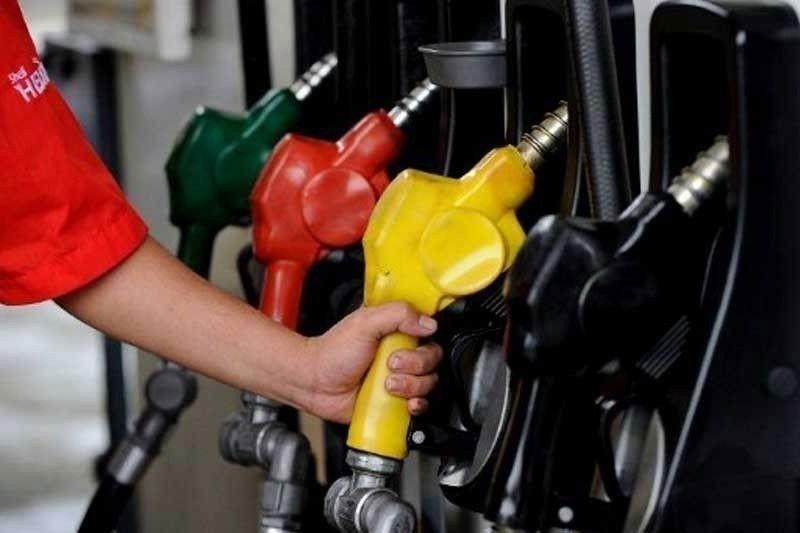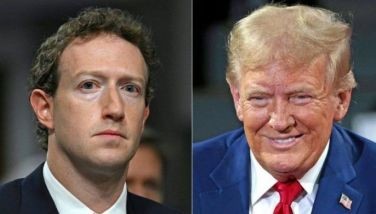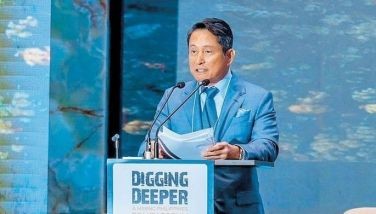Senator wants to raise oil reserve requirements to control pump prices

MANILA, Philippines — A senator on Monday suggested that the government should consider increasing the minimum inventory requirement (MIR) that oil companies must maintain in a bid to cushion the impact of the sustained increase in oil prices driven by tight global supply.
Sen. Sherwin "Win" Gatchalian, who chairs his chamber's energy committee, proposed that the government should consider increasing the minimum inventory requirement (MIR) to 45 days, from the previous 30 days.
Should the proposal push through, Gatchalian said the government must shoulder the carrying costs of the oil firms, which will have to pay for interest if they procure additional reserves which can last for 15 more days.
"I'm proposing to increase the 30-day minimum oil inventory to 45 days- that's an extra 15 days of buffer. The government should subsidize the carrying cost because when these companies buy another 15 days, they have to pay for interest. And that's where the government comes in terms of energy security," Gatchalian said during a Senate energy panel hearing.
The Energy department, under a department circular issued in 2003, requires oil companies, excluding refiners, to secure a minimum inventory requirement (MIR) of 15 days for petroleum products, excluding liquified petroleum gas.
Meanwhile, oil refiners have to secure crude oil and refined petroleum product reserves which can last for 30 days.
However, industry groups and an oil company said there is no need to increase the MIR as this would only lead to a spike in oil prices, pose a burden to oil companies, and discourage more players from entering the market.
'Not realistic'
"If you increase it (the MIR) now, you will cause a spike in prices because prices are demand-driven so if everybody starts buying double the requirement, you exacerbate the price. It [also] entails capex for storage and carrying costs, assuming you can afford it," Raffy Capinpin, Philippine Institute of Petroleum (PIP) Executive Director, told senators.
According to Capinpin, increasing the MIR also raises the barriers to entry. PIP's members include major oil firms such as Petron Corp., Shell, Total and Caltex, among others.
"Rather than promoting more investments from small players, we are facing the barrier once again. Maybe some of them might not be able to afford it. It may be counterintuitive," Capinpin explained.
Mia Santos Delos Reyes, a representative from Petron, also raised logistical and financial concerns in raising the required reserves for oil companies.
"There are certain facilities that may not be able to hold or accommodate [the extra reserves]. There are inherent concerns, logistical concerns in some facilities so if it is going to be imposed, if it is going to be mandated, it may require huge capex (capital expenditures) or even inability of some players to comply because of...constraints," Delos Reyes said during the hearing.
Ferdinand Martinez, President of the Independent Philippine Petroleum Companies Association (IPPCA), described the proposal to increase the MIR "not realistic", citing the physical limitations of some firms in terms of how much oil they can store.
He also said that it takes only a week, at most, to transport imported oil along the major supply route.
'Suspend excise taxes'
Local pump prices have increased since the start of the year. At present, domestic oil firms have yet to announce the latest weekly price hikes for each liter of gas, diesel and kerosene.
Martinez of the IPPCA said his group supports the halting of the fuel excise tax collections, echoing the calls of other senators.
The excise tax on gasoline now stands at P10 per liter, P6 per liter for diesel, and P5 per liter for kerosene, according to the Tax Reform for Acceleration and Inclusion (TRAIN) Law, which was implemented in three tranches starting 2018.
Martinez claimed that removing the fuel excise taxes will not be a big blow to government since it can still benefit value-added taxes (VAT) which it currently collects.
"We have the 12% VAT...If you suspend the excise tax, the government won't lose much because it will still get to collect the VAT," he explained in Filipino.
Gatchalian earlier said that suspending fuel excise taxes is not practical as it will incur foregone revenues of P271.24 billion, based on estimates from his office. The more practical solution, according to him, is having an integrated version of the Pantawid Pasada, a fuel subsidy program for public utility vehicles, which will only cost the state P1.94 billion.
The Department of Finance (DOF) again maintained its stand on Monday that it does not support the halting of the fuel excise tax collections.
"[The DOF] does not support the various proposals to lower or suspend the TRAIN fuel excise taxes because this will translate to significant foregone revenues and this will be detrimental to our recovery in long-term growths," DOF Undersecretary Valery Brion said during the Monday hearing.
"However, the government remains ready to provide targeted relief assistance and support to address the impact of oil price hike or affected sectors, especially the PUV drivers, farmers and fisherfolk," she said.
Last week, Energy Secretary Alfonso Cusi said that the Philippine government doubled its budget for fuel subsidies to P6.1 billion, from the previously reported P3 billion, in hopes to helping the public transportation and agriculture sectors cope with the rising oil price hikes.
READ: DOE: Fuel subsidies for public transport, agriculture raised to P6.1B
On Monday, Sen. Risa Hontiveros, who is running for another term as senator, said increasing the budget for the Pantawid Pasada is a "step in the right direction", but it is not enough to help drivers in the long-term.
The big step, she said, is rolling out an expanded service contracting program, which will run for years. Under service contracting, drivers are assured of incentives based on the number of weekly trips they've made.
"When we are able to move people without the daily hassle and pain, car owners who will suffer from high fuel prices the most, can be more easily persuaded to use their street-congesting cars less often as they transition into public transport," Hontiveros said in a statement.
DOE 'studying' national petroleum reserve
The Department of Energy (DOE) said it is still studying the viability of having a strategic petroleum reserve. Having such a feasibility is crucial since it will be used as a basis for evaluation by Congress, according to DOE Undersecretary Gerardo Erguiza.
At present, it is only the private sector that has oil reserves.
Sen. Richard Gordon on Monday urged the government to find ways to set aside stocks of oil and gas to ensure sufficient supply for the country.
In a statement, Gordon also suggested that Filipinos should look for additional sources of income to offset the losses due to the oil price hikes.
To save on fuel consumption, the re-electionist lawmaker suggested that families should carpool, invest in renewable energy sources for their energy requirements. He added that farmers should consolidate their delivery schedules of their produce to markets.
- Latest
- Trending
































